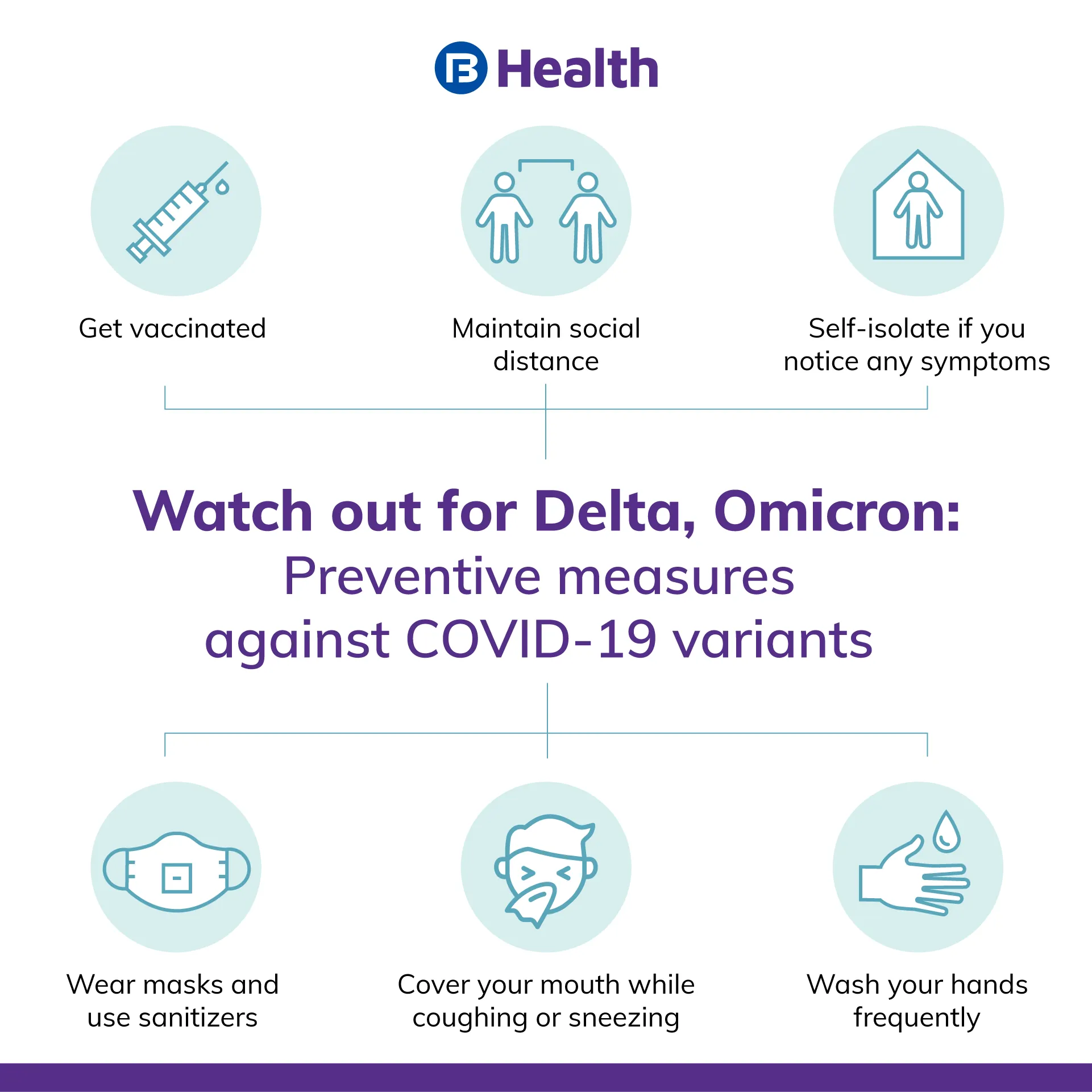Covid | 4 min read
After Delta, Will Omicron End The Pandemic
Medically reviewed by
Table of Content
Key Takeaways
- Delta, omicron are two of the most common COVID-19 Variants of Concerns
- Omicron antibodies after infection can help in preventing re-infection of delta
- Key omicron and delta difference lies in their severity and transmissibility
Caused by the SARS-CoV 2 virus, COVID-19 is an infectious disease caused by many variants of the coronavirus. The variants are mainly differentiated into three categories depending on their severity. One of these categories is Variant of Concern. Under this, the variants are more infectious and fatal. The vaccine's effectiveness also decreases against Variants of Concern. Gamma, beta, omicron vs delta are the common COVID-19 Variants of Concern.
Delta variant is one of the most contagious variants of COVID-19. Around 75,000 people have been infected with the delta variant [1]. Unlike delta, omicron is a variant that is transmissible four times more than delta. It has affected almost 60% of the global population [2]. The severity and symptoms of omicron are comparatively on the milder side than delta. As a result of this, the question of will omicron end the pandemic has arisen. Before answering that, it is important that you understand omicron vs delta differences. Read on to know more about delta, omicron differences, their symptoms, and antibodies.

Omicron vs delta differences
Two major differences between omicron and delta lie in their severity and transmissibility. When compared with delta, omicron variant is comparatively less severe. According to a study, in omicron cases there is 53% less risk of hospitalization, 74% less risk of ICU admission, and 91% less risk of fatality [3]. The symptoms of omicron are milder and so is its severity. One of the reasons for omicron’s low severity may be the high number of vaccinations. Around 64% of the global population has got at least 1 dose of COVID-19 vaccine [4].
Additional Read: COVID-19 vs FluThough omicron is less severe, WHO is considering it as a mild variant as it is 4 times more transmissible than delta. It has also affected around 60% of the global population. A reason for high contagiousness is the incuba.
.
.tion period of omicron. Compared to delta, omicron has an incubation period of 3 days instead of 4. This means that you have less time to protect yourself and others around you. Another reason is that omicron can stay in your upper respiratory tract and multiply 70 times faster than the delta variant [5].
Omicron vs delta variant prevention

Symptoms
Common symptoms of omicron are
- Runny nose
- Headache
- Sneezing
- Fatigue
- Sore throat
These symptoms are also common in delta variant. You may also experience persistent cough if infected by delta variant.
Some rare or less occurring symptoms of omicron and delta variant are
- Shivers or chills
- Fever
- Loss of smell
- Chest pain or shortness of breath

Keep in mind that the first symptoms of omicron infection are
- Sore throat
- Congestion
- Headache
Runny nose and headache are the most common symptoms in omicron. Also note that in vaccinated people, omicron symptoms resemble more like a cold or flu.
Other than these, key differences in omicron vs delta symptoms are
- Symptoms of delta may last for 10 days and omicron symptoms may last for 5 days
- In case of delta, you may get a high fever (101-103 F) and in omicron you may get moderate fever (99.5-100 F)
- Loss of smell and taste is common in delta infection but not in omicron
- Delta infection has a more severe effect on your lungs compared to omicron
Omicron vs delta antibodies
With new variants, one of the questions that you may ask is, “If I had delta can I get omicron?”. The answer is yes. Current data suggests that an omicron infection is possible even if you had delta. Another thing is that omicron protects against delta but only for vaccinated people. However, the same cannot be said for delta antibodies. The immunity against omicron from delta antibodies is comparatively limited. Also, antibodies from omicron protects against delta reinfection too.
Wondering how long do omicron antibodies last? Note that omicron antibodies after infection can last up to 6 months [6].
Additional Read: Coronavirus ReinfectionWill omicron end the pandemic? Probably not. Despite its low severity, there are speculations that omicron will not be the end of pandemic [7]. With this information, it is important that you take all the necessary precautions to protect yourself. Keep an eye out for symptoms of COVID-19 and its variants. If you notice any signs, quarantining yourself and talking to a doctor are the first steps. Book an appointment for online consultation on Bajaj Finserv Health. This way, you can get treated from your home and reduce the risk of severity and spread of infection.
References
- https://www.statista.com/statistics/1245971/number-delta-variant-worldwide-by-country/
- https://www.downtoearth.org.in/news/health/nearly-60-of-global-population-to-be-infected-with-omicron-by-march-ihme-81086
- https://www.medrxiv.org/content/10.1101/2022.01.11.22269045v1
- https://www.nytimes.com/interactive/2021/world/covid-vaccinations-tracker.html
- https://www.med.hku.hk/en/news/press/20211215-omicron-sars-cov-2-infection?utm_medium=social&utm_source=twitter&utm_campaign=press_release
- https://www.continuitycare.co.uk/covid-antibodies-last-at-least-six-months-in-most/
- https://www.gavi.org/vaccineswork/could-omicron-variant-end-pandemic
Disclaimer
Please note that this article is solely meant for informational purposes and Bajaj Finserv Health Limited (“BFHL”) does not shoulder any responsibility of the views/advice/information expressed/given by the writer/reviewer/originator. This article should not be considered as a substitute for any medical advice, diagnosis or treatment. Always consult with your trusted physician/qualified healthcare professional to evaluate your medical condition. The above article has been reviewed by a qualified doctor and BFHL is not responsible for any damages for any information or services provided by any third party.
